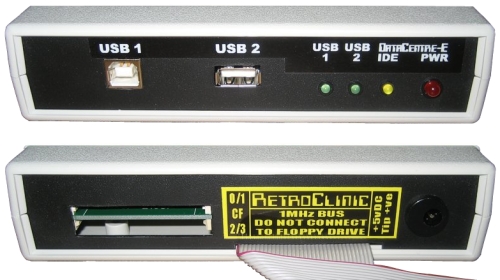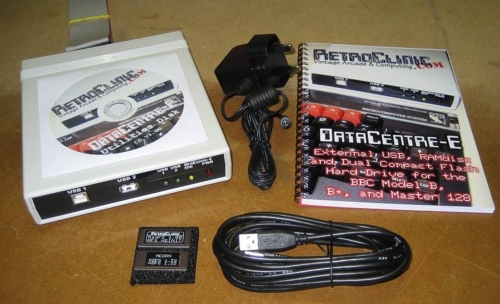|
 |
The BBC Microcomputer
System (BBC Micro) |
DataCentre from
RetroClinic

DataCentre
Available in internal and external models, DataCentre
is a modern day upgrade for a BBC Model B, B+ or Master 128
computer that provides a number of additional features,
including :-
- 2 Compact Flash slots that can be used by the ADFS
system to emulate up to 4 large hard drives
- 2 USB Ports
- A USB Host Controller allowing USB devices, e.g.,
Flash Drives, Hard Drive etc. to be connected to the BBC
- A USB Slave Port enabling the BBC to be connected to
a PC for File Transfer
- A 1MB RAM Disk
- 64K of non-volatile RAM
DataCentre was designed and produced by Mark
Haysman (RetroClinic).
I had intended to type up a few notes about DataCentre
on this page, my offering would probably not have done the
product justice, when Mark advertises them on ebay, he includes
a comprehensive description that provides a much better
explanation of what DataCentre is than I could do,
so, in Mark's words . . . . . . . .
"External DataCentre-E
Upgrade kit, suitable for the BBC Model B, B+ and Master 128
Computers. The USB Section can also be used with an Acorn
Electron, if you have an ACP Plus 5 adaptor.
What is it?
DataCentre is our popular 5 in 1 upgrade for the BBC Computer
range from RetroClinic. It is a leap forward for the BBC,
bringing the connectivity of USB to the BBC Micro for use not
just as a storage medium, but as a new way to connect modern
hardware to your vintage machine.
The external version of the
DataCentre system provides all the functions of the internal
version, with the convenience of having the unit housed in a
separate box - no internal fitting, and easy to swap between
machines, and it looks right at home next to a Beeb, with it's
matching cream plastic case.
- USB Host Controller,
allowing connection of virtually any USB device including
Flash Drives, Keyboards, Mice etc.
- USB Slave Port, allowing
connection directly to your PC
- 1 Megabyte RAM for use by
drivers, filing systems or the user.
- 64K Byte Non-Volatile RAM,
used as a small RAM Drive for storing commonly used programs
and utilities.
- Dual Compact
Flash slots, for use by the ADFS system as up to 4 large
hard drives, separate from the USB storage
The DataCentre is both simple to use
for the first time user, and highly programmable by those with
the knowledge. It cuts out the extra step common to all
other storage systems for the BBC, that of the "transfer
software" on the PC. With the DataCentre system, you no longer
need any software on the PC whatsoever.
How does it work?
You simply use
any USB storage drive, of any capacity, be that a solid state
Flash Drive, or a conventional Hard Drive in a USB Enclosure,
and as long as it is formatted with the FAT or FAT32 filing
system, it will be recognised. Most modern PCs, Macintoshes and
Linux based machines will automatically recognise such a drive.
You then download the software you want directly to it, or onto
your PC hard drive and then drag the files across.
Once on the USB drive, this is simply
inserted into DataCentre, and the BBC can now see all those
files. With a single command, the image can be imported either
to one of the 4 available RAM Drives, or directly onto a Floppy
Disk if you have a floppy drive and interface. You can then go
on to play the game, or modify that disk image whilst on floppy
or in the RAM drive, or even use your own floppy discs, and
export them back to the USB drive in one of two standard
universal formats, known as SSD or DSD. These images can then be
immediately used on the PC by plugging the Drive back into the
PC USB port, either to upload to your website, or use in an
emulator, or to archive on CD etc.
You don't even need to use an image,
you can save Basic programs and data direct to the USB drive,
and those files can be instantly read by your PC, or put any
file you like onto the USB drive, and the Beeb can see it, again
without having to mess with DFS Image manipulation tools.
DataCentre doesn't restrict you like
other MMC or SD based systems. There's no limit to the size of
device you can use, be it the latest 64GB USB Flash drives, or a
2TB Hard drive in a USB enclosure. No hunting to find old
obsolete cards and a reader to go with them, USB sticks are the
accepted standard medium for PCs, and with DataCentre, your Beeb
can read them too. The mains adaptor supplied with the system
provides enough power to allow you to connect an external "USB
Powered" Hard Drive, and can supply power though a hub, up to 1
Amp.
The Compact
Flash System
The DataCentre-E unit is also equipped with 2 Compact Flash
slots. You can use either one, or both, to provide up to 2GB of
online storage for ADFS, and use it in exactly the same way as
Acorn designed for the original Winchesters. The system is fully
backwards compatible with my existing CF Hard Drive system, so
if you have one with several cards of software, they can simply
be plugged into the DataCentre-E and will work as they did
before.
Whilst the USB and RamFS system
required no transfer software to get your images onto the Beeb,
for the Compact Flash system, several programs are supplied on
the CD to aid in getting your software onto the CF system. These
specially written programs allow you to plug the CF card into
your PC, via any USB Multi Card Reader, and take an image of the
card for backup purposes, and write the image back to the same
card, or another one of the same size. The Image these programs
create are fully compatible with Jon
Welch's ADFS Explorer,
which allows you to load the image, browse it, add and delete
files from downloaded floppy disk images, change the size of the
drive for larger CF cards, manipulate it in almost any way you
wish. You can then save that image, and reload it back to a CF
card, and presto, your files are instantly ready to use on your
Beeb in ADFS. And as it's an external unit, no opening the lid
everytime you want to change card either! The backup and restore
programs are supplied free with the kit, but DFS & ADFS
Explorer are shareware, and whilst trial versions of both are
included on the CD, they require a small registration fee to the
Author for full functionality, please see his website for
details. Sample hard drive images containing a
selection of public domain software and games are also on the CD
for you to try and use as a basis for your system. You
can also use the USB system to transfer software directly onto
the CF Hard Drive using the Beeb, if you prefer to do it that
way.
You can add the system to virtually
any specification of Machine, and it connects via the 1MHz bus
port. You will also need one or two free ROM sockets, one for
RamFS, the software that drives the RAMdiscs and the USB system,
and another for a modified version of ADFS, if you wish to use
the Compact Flash system. The Ram Filing system that comes with
the board does not use up main memory, so PAGE is kept as it was
before, &E00 on a Master and on a standard B, no Sideways RAM is
needed. You don't even need to have a disk system, with the 4 x
200K RAM Drives available, you instantly have access to
virtually every peice of disc software ever written for the Beeb
on the net. ADFS for the Model B in ROM does use up some of the
system memory, but a version that uses Sideways RAM is also
supplied, which does not eat up any precious memory. The Master
version of ADFS does not use any system memory.
What else
can it do, besides storage?
The DataCentre system is not just a "Storage Only" upgrade -
it's a fully functional USB 2.0 specification host, and as such,
you can use virtually any USB device in it you like, including
Keyboards, Mice, Joysticks, Hubs etc. DataCentre opens up the
Beeb to a whole new world of connectivity. As with any USB
device, drivers are needed, and a sample USB Mouse program is
included to get you started in programming your own device
drivers for your application.
The DataCentre system is not a
"closed" environment. The 102 page printed manual gives you all
the technical details you need to program the USB system
yourself, as well details on using the full 1MB of RAM for your
own application. Full specifications on the hardware used for
the USB controller are all included in the kit. If you've got a
USB gadget on your PC and you fancy running it on the Beeb, well
now you can! The commands to communicate with ANY USB device are
built into the system, all you have to do is write the software
to do what you want it to do!
What comes
with it?
The full kit contains the following items, as shown
in the photo below:
- DataCentre-E
Main System Box with built in 1MHz Bus ribbon cable
- Mains power adaptor with UK
plug (Euro adaptors can be supplied on request, or a power
lead for connection to the Beeb AUX power socket can be
provided in leiu of the external power supply at no extra
charge)
- 1 x 27256 ROM containing
RamFS and the Compact Flash formatting utility
- 1 x 27256 ROM containing ADFS
1.33 and ADFS 1.53
- USB A Plug to B Plug Cable
- 102 page printed and bound
User Guide
- New ADFS User Guide, covering
use of the CF Hard Drive system (Not Picutred)
- Utility
CD, contating a multitude of extra manuals, samples and
other programs
Updates to the Firmware on the board
can be done by the user, and details for this are given in the
instructions. Updates to the RamFS ROM are free of charge to all
users, again details on this is given in the instructions in the
kit. More info can be found on my
website. If you require extra sets of ROMs, so you can move
the external unit between machines, these can be supplied either
at time of purchase, or at a later date.
The unit is also available with an
external 1MHz bus pass thru socket on the rear."

|